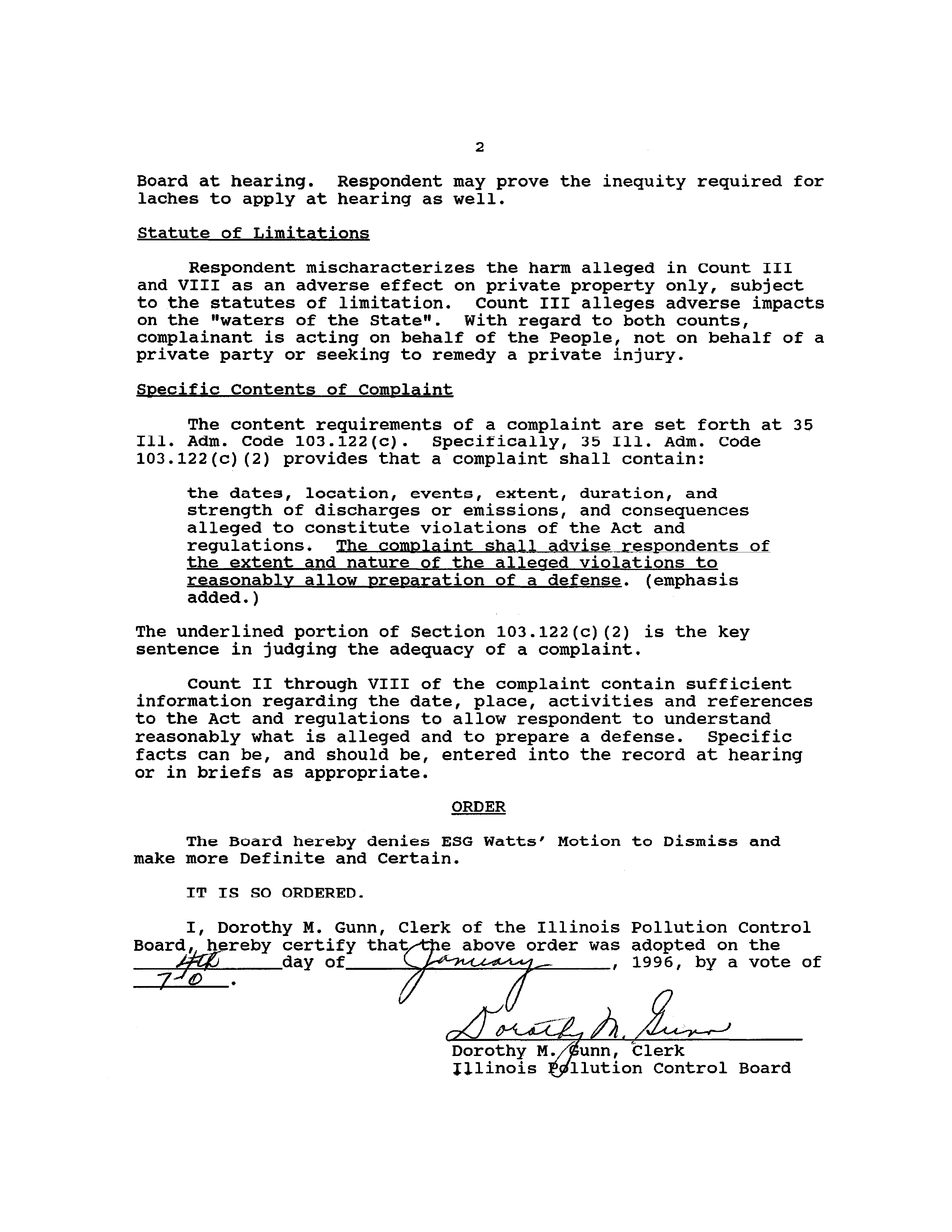SLeL.LNOiS
POLLUTiON
CONTROL
BOARD
January
4,
1996
PEOPLE OF THE STATE OF ILLINOIS,)
Complainant,
)
V.
)
PCB 96—107
)
(Enforcement—Air, Water
ESG WATTS,
INC., AN IOWA
)
and Land)
CORPORATION,
Respondent.
ORDER OF THE BOARD
(by E.
Dunham):
This matter comes before the Board on a “Motion to Dismiss
and to Make More Definite and Certain” filed on December
1,
1995
by ESG Watts,
Inc.
(ESG Watts).
The complainant filed its
response to the motion on December 11,
1995.
ESG Watts moves to dismiss Counts II,
III,
IV, V,
VI, VII
and VIII or,
in the alternative,
to make the complaint more
definite and certain.
ESG Watts seeks dismissal of Counts III,
IV, V, VI, VII and VIII because the allegations in these counts
violate the doctrine of laches.
ESG Watts claims that Counts III
and VIII should be dismissed because the complaint was not filed
within the statute of limitations.
ESG Watts claims that Counts
II through VIII do not contain specific information and
therefore, should be dismissed or be made more specific.
The complainant objects to the motion to dismiss and
requests that it be denied.
The complainant maintains that the
doctrine of laches is not applicable to matters before the Board.
Complainant also maintains that there is no statute of
limitations in this matter.
Complainant asserts that the
complaint is sufficiently specific as to infon ESG Watts of the
alleged violations.
Doctrine of Laches
With regard to the doctrine of laches, respondent has not
proven any tardiness on the part of complainant has been
prejudicial to respondent.
While this could potentially be
proven at hearing, the Board finds insufficient grounds for
dismissal.
Count IV of the complaint alleges that an ongoing Violation
of respondent’s NPDES permit began in 1986 and continues to the
present.
The complaint itself states that respondent has been
previously adjudicated to be in violation of the NPDES permit.
Any claims of violation previously adjudicated are barred by Res
Judicata, any violation not adjudicated may be argued to the
2
Board at hearing.
Respondent may prove the inequity required for
laches to apply at hearing as well.
Statute of Limitations
Respondent mischaracterizes the harm alleged in Count III
and VIII as an adverse effect on private property only,
subject
to the statutes of limitation.
Count III alleges adverse impacts
on the “waters of the State”.
With regard to both counts,
complainant is acting on behalf of the People, not on behalf of a
private party or seeking to remedy a private injury.
Specific Contents of Complaint
The content requirements of a complaint are set forth at
3.
Ill. Adm.
Code 103.122(c).
Specifically,
35 Ill. Adm. Code
103.122(c) (2) provides that a complaint shall contain:
the dates, location, events,
extent, duration, and
strength of discharges or emissions,
and consequences
alleged to constitute violations of the Act and
regulations.
The complaint shall advise respondents of
the extent and nature of the alleged violations to
reasonably allow preparation of a defense.
(emphasis
added.)
The underlined portion of Section 103.122
(C)
(2)
is the key
sentence in judging the adequacy of a complaint.
Count II through VIII of the complaint contain sufficient
information regarding the date,
place, activities and references
to the Act and regulations to allow respondent to understand
reasonably what is alleged and to prepare a defense.
Specific
facts can be, and should be, entered into the record at hearing
or in briefs as appropriate.
ORDER
The Board hereby denies
ESG Watts’
Motion
to
Dismiss
and
make more Definite and Certain.
IT IS SO ORDERED.
I, Dorothy M.
Gunn,
Clerk of the Illinois Pollution Control
Board, hereby certify that
e above order was adopted on the
day of
-
,
1996, by a vote of
Dorothy M./~unn,~lerk
Illinois ~Jllution Control Board
7~’~t~


